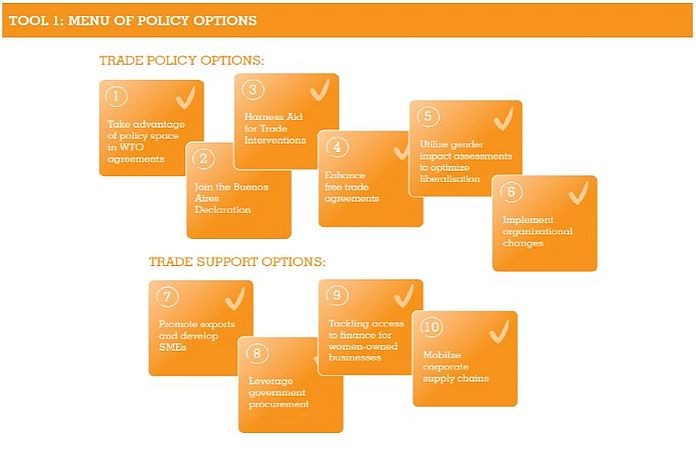By ITC News
GENEVA, Switzerland – A new International Trade Centre (ITC) report shows policymakers how to unlock markets for women through inclusive trade policies. From Design to Evaluation: Making Trade Policy Work for Women is the latest in a series of ITC trade policy publications focusing on women.
Policymakers can use the guide to create inclusive policies in trade, industry or small business institutions. It outlines steps to use data that spot opportunities in value chains, engage partners, carry out policies and monitor their impact.
ITC has tested this approach in Bangladesh, the Gambia, Ghana, Nigeria, Sierra Leone, and Uganda and Zambia, among others. It has resulted in revised acts and regulations, new policies and better data collection on women in business.
‘Gender equality is a force for change. Trade policies are beginning to reflect this,’ said ITC executive director Pamela Coke-Hamilton. ‘The challenge for many governments is to translate political will into practical policies and interventions that fit their country priorities and specificities.’
Supporting the Buenos Aires Declaration
Since the Buenos Aires Declaration on Women and Trade was launched at the World Trade Organization (WTO) Ministerial Conference in 2017, 127 countries have endorsed it. In 2020, governments shared their insights to keep moving forward, captured in Delivering on the Buenos Aires Declaration.
Progress on women and trade also will likely be on the agenda of the next WTO Ministerial, which runs from November 30 to December 3.
This guide can support these discussions by helping governments focus on specific reforms to empower women in trade, as well as accompanying domestic policies.
Many WTO Members that express interest in taking further national action want to know how to make it happen. This guide helps them do that, providing a decision tree to identify where they are in the policymaking process, followed by steps towards better trade policies. Each step includes a mini toolkit, questionnaires and tips to leverage trade policies, identify opportunities in value chains, design and deliver action plans, and monitor and evaluate impact.
It also encourages governments to use public and private procurement markets to accelerate the economic empowerment of women, improve pro-women policies within trade support institutions and design supportive programmes for small businesses.





